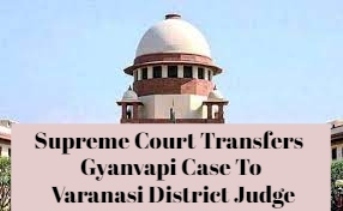

By Sunil Garodia
First publised on 2022-05-20 13:34:29
In a surprise move, the Supreme Court transferred the plea asking it to decide on the legality of the videographic survey of Gyanvapi mosque complex ordered by a Varanasi ocurt to the Varanasi district judge. The apex court said that the matter would be decided by the district judge who is experienced and knows how to handle the case. In the meantime, the court said that the people who go to offer namaz in the complex must be provided all amenities as directed in its earlier order and the area where the shivling was found must be protected and this should remain in force till eight weeks after the decision of the district judge in order to give time for the party aggrieved by his order to appeal against the same.
But the apex court added another dimension to the case and the Places of Worship Act. In an oral observation that can have wider ramifications, the bench said that although the said Act prohibited changing the character of a place of worship from as it stood on 15th August 1947, nothing in the Act barred any authority from determining the religious character of a place or a place of worship. This in itself is a hint that according to the top court, the setting up of the commission and the ordering of the videographic survey by the Varanasi court will not fall foul of law for the judge had ordered it to determine the character of the place of worship.
This, though legally correct, will mean that thousands of pleas are likely to be filed in courts all over India to determine the character of a place of worship. That would be the first phase. As it is well known that several temples were razed to build mosques and now a Muslim organization has also put forth that when Hindus converted as a bloc in the periods of Muslim rule, they allowed mosques to be built where temples existed and some of them still carry remnants of the temples, such determination exercises will bring out these facts and then, in the second phase, there will be a huge movement to junk the Places of Worship Act and reclaim the temples.
Further, what happens when a court orders such a survey and finds out that a temple in fact existed hundreds of years ago where the mosque stands now? Let us take the Gyanvapi case. If the trial court opens the survey report and decides that the mosque was built by razing a part of a temple, will it allow the plea of the petitioners for right to worship throughout the year in place of once a year at the designated place and right to worship before the "other visible and invisible deities" inside the complex, if found in the survey? Will the judge do so by stopping Muslims from offering namaz or allow people of both religions to pray at designated spots? If the judge allows any of the things, will it amount to changing the character of the place of worship?
Clearly, there are too many questions of law involved in the matter and it seems that once again, cases will stretch for years and resulting in communal strife and ill-will between communities. Sadly, there seems to be no way out as it now seems that even the Places of Worship Act is not fully equipped to settle matters one way or the other.











